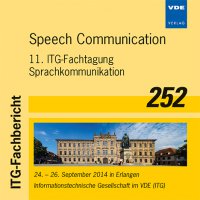I-vector Speaker Verification for Speech Degraded by Narrowband and Wideband Channels
Conference: Speech Communication - 11. ITG-Fachtagung Sprachkommunikation
09/24/2014 - 09/26/2014 at Erlangen, Deutschland
Proceedings: Speech Communication
Pages: 4Language: englishTyp: PDF
Personal VDE Members are entitled to a 10% discount on this title
Authors:
Fernandez Gallardo, Laura; Moeller, Sebastian (Quality and Usability Lab, Telekom Innovation Laboratories, TU Berlin, Germany)
Fernandez Gallardo, Laura; Wagner, Michael; Moeller, Sebastian (Faculty of Education, Science, Technology and Mathematics, University of Canberra, Australia)
Wagner, Michael (College of Engineering and Computer Science, Australian National University, Australia)
Abstract:
Voice biometrics are frequently exposed to channel degradations of transmitted speech and to channel mismatch between enrollment and test utterances, which cause speaker recognition systems to perform poorly. In this paper, the influence of channel bandwidth and speech coding on speaker verification is assessed employing the state-of-the-art i-vector technique. Our focus is on the possible benefits of enhanced wideband over narrowband and on the effects of codec mismatch and bandwidth mismatch. Our results on subsets of the NIST SRE (Speaker Recognition Evaluation) 2010 and of the TIMIT corpus show that the performance with wideband data is significantly better than that employing narrowband signals for matched and codec-mismatched conditions. In the presence of bandwidth mismatch, a relative improvement of 40-70% can be obtained by downsampling the wideband signal to 8 kHz.


